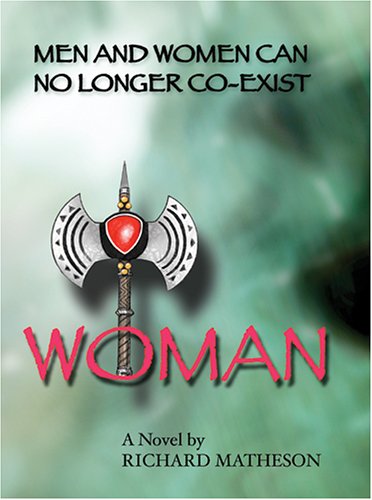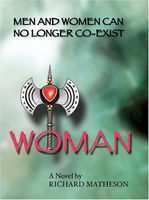- Welcome to FictionDB, Guest
- | My Account
- | Help

Woman — Richard Matheson
AFTERWORDWhen I am asked how I got the idea for any particular novel, I can (usually) provide an answer.For I Am Legend, it came while I was viewing Bela Lugosi's Dracula. It occurred to me that if one vampire is scary, what if the whole world was full of vampires? For The Shrinking Man, the idea came during another movie I was viewing. Many of my ideas came from movies - most likely not very good movies. A good movie does not create ideas since I am totally involved in it. A poor movie, on the other hand, might have some small element which brings on my imagination. So it was with this film. In a brief moment, which had nothing to do with the overall story Ray Milland unwittingly dons Aldo Ray's hat. His head being smaller than Ray's, the hat comes down over his ears. What, it came to me, would Ray Milland think if it was his own hat which now was too big for his head? Thus the genesis of a story about a man who discovers that he is shrinking. For Hell House the notion arose as a result of many years of reading about haunted houses topped by a reading of Shirley Jackson's novel about Hill House. She never (in my memory) indicated the presence of an actual ghost. At least she never described one. The ghosts she had in mind were more than likely created by the psyche of one of the two women who came to the house. They were psychological ghosts brought on-or released-by the dark atmosphere of the house. I didn't choose to go that route. I wanted my house to contain tangible ghosts. While the atmosphere of Hell House certainly has an effect on the minds of its quartet of invaders, visible, audible ghosts exist as well. And for A Stir of Echoes recollections of a tract house my wife and I-and our two (then) children lived in-plus a desire (motivated by a beginning dislike of the genre concept) to combine a ghost story with a murder mystery brought on that novel. For Woman . . . nothing. No memory whatsoever of its creative birth.It seems most peculiar to me that such a (I hope) provocative concept came to me and left no trace of its genesis. My wife has suggested that a three-year period during which I was writing a six-hour television adaptation of Philip Wylie's The Disappearance brought on the notion. In Wylie's story, half of the disappearance results in a world populated exclusively by women, with the logical results of that condition. As I recall, the world, struggling back from technological limitations, does become a workable, more humane society-while the other half of the world, exclusively men, goes (rather rapidly) all to hell. As it probably would. It certainly seems a reasonable idea that this adaptation (never filmed, I add regretfully; another unrealized dream) engendered the germ of an idea which ultimately became Woman, first a play (as yet unstaged), then the novel which you just (I assume) read. I don't remember it happening that way, however. Even more strangely, I don't recall research reading on the subject although, obviously, I did, quoting a number of sources in the novel. So, how did it happen? Did I channel some otherworldly manuscript? Did I contact Philip Wylie while I was sleeping? I doubt any of that. It's my concept, my story. Still, that a concept so specific, a concept rather unique (I think) should not be clearly deposited in my memory bank remains perplexing to me. However, I imagine that any number of story and novel ideas I've come up with in the past 60-plus years have no source remembrance in my mind. With regard to Woman, though, I have for many years certainly subscribed to its concept. That the so-termed female revolution (feminism) has resulted in many major alternations in society-alterations positive to the world--goes (I hope) without saying. Women in business, women in politics, women in education, women in religion, women in all areas of society itself. But is it enough? Has Nature (Mother Nature I feel compelled to add) come to the ultimate, albeit reluctant conclusion that revolution is not enough? That evolution must now perforce be activated in order to conclude Man's unending destruction of the world and all living things on its surface? What more is there to say? Could be.
Genres
Sub-Genres
Click on any of the links above to see more books like this one.

